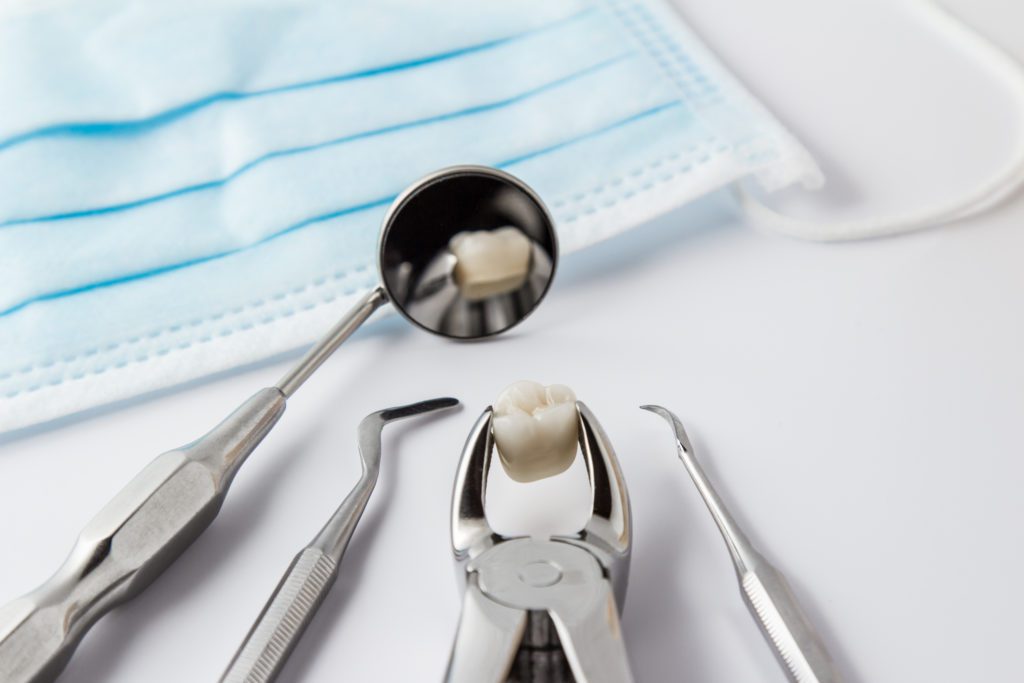Keeping all of your adult teeth is the best option for protecting your oral health, but sometimes there’s an issue that’s just too severe to fix. Dr. Michael Courter provides tooth extractions in Midland, TX as a general dentistry procedure. If Dr. Courter decides an extraction is necessary, we’ll take every precaution to make sure the process goes as smoothly as possible.
Although many patients may think that dental extractions are painful, they actually relieve a patient’s tooth pain. Patients with infected, impacted, or even overcrowded teeth can alleviate their pain with a dental extraction procedure.
We can also provide dental sedation to patients for more complex extractions. Removing problem teeth helps the overall smile recover.
Dr. Courter can also provide dental restorations like dental implants to replace teeth that have been removed due to infection. Keep reading to learn about tooth extractions and wisdom teeth removal at our dental office.

What are Simple and Complex Tooth Extractions?
Tooth extractions are often categorized as simple or complex. Simple tooth extractions remove teeth that are above the gum line. Complex dental extractions remove teeth that are at or below the gum line. It may take longer to perform this type of extraction.
We can provide local anesthetic for both simple and complex extractions. For complex tooth extractions, we can offer nitrous oxide and oral conscious sedation to relax patients and provide pain-free treatment.
Reasons for A Tooth Extraction
If you are experiencing any of the following concerns, tooth extraction may be the best choice for both your smile and your overall well-being:
- Severe trauma or injury that is too extensive repair.
- An advanced infection that has weakened the tooth and can’t be stopped with root canal therapy or antibiotics.
- An overcrowded mouth that doesn’t leave enough room for successful orthodontic treatment.
- Gum disease has destroyed the tissues connecting the tooth to the jaw.
- An impacted tooth means that it hasn’t properly erupted through the gums.
Removing Impacted Wisdom Teeth
Wisdom teeth normally come in between the ages of 17 and 25. Dentists call them “third molars” because they erupt in the back of the mouth behind the second molars. Unfortunately, they often become impacted because there’s usually not enough room in the mouth at that point.
The wisdom teeth are stuck at or below the gum line and can damage the adjacent molars. This causes pain and various oral health problems if they do not fully erupt properly.
Although not every patient with wisdom teeth requires a dental extraction, removing impacted wisdom teeth can prevent tooth pain or damage to the molars. Dr. Courter routinely performs wisdom tooth extractions in our North Midland dental office.
He will make sure you are comfortable during this often-necessary procedure. If you have concerns about your or your child’s wisdom teeth, contact our dental office today to discuss the need for a wisdom tooth extraction procedure.
How Do I Know If I Need to Remove My Wisdom Teeth?
Some patients actually don’t need to have their wisdom teeth extracted. If the teeth can erupt without issue, it’s safe to keep them as long as you can clean them properly. However, your dentist will need to remove them if you notice any of the following symptoms:
- Impaction. Wisdom teeth that don’t have enough room to emerge from the gums can cause all kinds of problems, including jaw pain and stiffness, swollen or bleeding gums, and difficulty opening your mouth.
- Misalignment. If your wisdom teeth take up too much space, they can crowd the other teeth, causing crookedness and bite problems.
- Cavities and Gum Disease. Wisdom teeth can create areas in the gums where bacteria and food particles can hide, increasing the risk of tooth decay and gum inflammation.
Request a Tooth Extraction Consultation
Are your infected or impacted teeth affecting the rest of your smile? Contact Dr. Courter’s North Midland office today for a dental extraction at 432-287-9531. Feel free to schedule a dental consultation on our website.
Dr. Courter sees patients from Midland, the Permian Basin, and Odessa, Texas. Please let him or a member of our dental team know if you have any questions or concerns.
